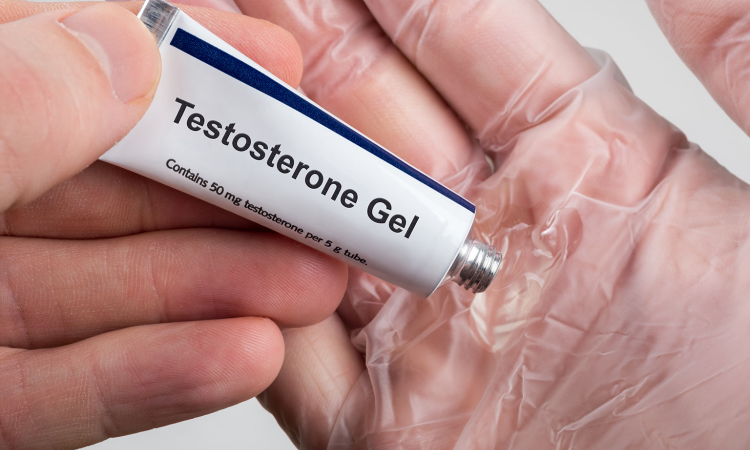Testosterone: What It Is, How to Boost It Naturally, and How Testosterone Gel Works
Understand what testosterone is, how to naturally boost it, the foods and habits that help, and how testosterone gel works. Learn how to improve your health and why this hormone is essential.
HORMÔNIOS
Escolha Mast
11/21/20254 min read


Testosterone is one of the most important hormones in the body. It does not only affect men’s health, as many think. On the contrary, it plays essential roles in both men and women at all stages of life. Therefore, understanding how it works, what can increase its levels, and when gel replacement is indicated makes a big difference for your health.
Below, I explain everything you need to know about this hormone in a simple and objective way, focusing on reliable and up-to-date information.
What is Testosterone?
Testosterone is a steroid hormone primarily produced by the testes in men and by the ovaries and adrenal glands in women. It influences many areas of the body, affecting energy, mood, muscle mass, bones, and even heart function.
According to the Endocrine Society, adequate testosterone levels help maintain:
strength and muscle mass
bone density
libido
red blood cell production
daily energy
emotional regulation
Moreover, studies show that testosterone plays an important role in metabolism. An article published in the Journal of Clinical Endocrinology & Metabolism (2020) indicates that low testosterone levels are associated with increased abdominal fat and decreased daily energy.
How to Boost Testosterone Naturally
The good news is that you can increase testosterone with simple lifestyle changes. This does not replace medical guidance but significantly helps regulate hormone levels.
1. Sleep Well
Testosterone is mainly produced while you sleep. A study by the University of Chicago showed that sleeping less than 5 hours reduces testosterone levels by up to 15% in just one week (Journal of the American Medical Association, 2011).
Adequate sleep improves natural hormone production and reduces physical and mental stress.
2. Reduce Stress
Stress increases cortisol, a hormone that directly competes with testosterone. The more cortisol circulating, the lower the natural hormone production. Techniques such as deep breathing, leisure time, and short daily breaks make a real difference.
3. Strength Training
Resistance exercises, like weightlifting, are the best natural stimulus to increase testosterone. The Sports Medicine Journal (2022) confirms that moderate to high-intensity training elevates free and total testosterone in adults.
4. Avoid Excessive Alcohol
Alcohol reduces hormone production in the gonads and increases testosterone conversion into estrogen. Moderate consumption is essential to maintain balance.
Habits That Boost Testosterone
In addition to general practices, some daily habits can further enhance hormone production:
Safe sun exposure to maintain good vitamin D levels, which directly aid hormone synthesis.
Maintain a healthy weight. Fat tissue increases aromatase, an enzyme that converts testosterone into estrogen.
Consume healthy fats, like olive oil, avocado, and nuts, which provide building blocks for hormone production.
Ensure sufficient protein intake, essential for muscles and metabolism.
Avoid a sedentary lifestyle, as long periods of sitting reduce circulation and increase inflammation.
Each habit contributes a little, but combined, they create an ideal environment for the body to produce testosterone naturally.
Foods That Boost Testosterone
No single food works miracles, but some nutrients are essential for hormone production. Key foods include:
1. Eggs
Rich in “good” cholesterol, which serves as a base for testosterone synthesis. They also contain vitamin D and high-quality protein.
2. Lean Meats
Provide zinc, iron, and protein. Zinc, in particular, is crucial for hormone production. The National Institutes of Health confirms that zinc deficiency reduces testosterone.
3. Seafood
Especially oysters, which are high in zinc content.
4. Nuts
Almonds, walnuts, and other nuts are rich in monounsaturated fats that stimulate hormone release.
5. Avocado
A source of vitamin E, which supports gland health and hormone production.
6. Spinach
High in magnesium, a mineral that helps increase free testosterone. A study published in Biological Trace Element Research (2011) showed that magnesium raises hormone levels in active adults.


How Testosterone Gel Works
For some people, lifestyle changes alone are not enough. When levels are very low, a doctor may prescribe testosterone gel.
This form of replacement is absorbed through the skin and enters the bloodstream gradually. It mimics the body’s natural production, offering more stable hormone levels throughout the day.
Benefits of Testosterone Gel
improves libido
increases energy
reduces fatigue
improves body composition
stimulates muscle mass
enhances mood
A study published in the New England Journal of Medicine (2016) showed that gel replacement significantly improves mood, vigor, and physical function in adults with hypogonadism.
Important Precautions
Should only be used with medical prescription.
Dosage is individualized, depending on age, symptoms, and lab results.
Avoid skin-to-skin contact with others immediately after application.
Requires regular monitoring of prostate, hemoglobin, liver function, and lipid profile.
Hormone replacement without medical supervision can cause side effects such as acne, excessive red blood cells, and liver changes.
Conclusion
Testosterone is a vital hormone for maintaining a healthy body, energy, and quality of life. It affects muscles, metabolism, mood, and daily well-being.
The good news is that you can naturally stimulate testosterone production through adequate sleep, healthy nutrition, strength training, and positive daily habits. However, when levels remain low, testosterone gel can be a safe alternative — always with professional guidance.
References
Endocrine Society Clinical Practice Guidelines (2024)
Journal of Clinical Endocrinology & Metabolism, 2020
Journal of the American Medical Association, 2011
Sports Medicine Journal, 2022
National Institutes of Health (NIH) – Office of Dietary Supplements
Biological Trace Element Research, 2011
New England Journal of Medicine, 2016
Final Message
Now that you know more about testosterone, I invite you to make a small change in your routine today. Small steps can transform your health and life. Take care of yourself, support your body, and give it what it needs to function well.
Thank you very much for reading, and see you next time! 💛
ESCOLHA MAST
Escolha Mast is an informative website that publishes blog posts and also promotes products that can help you in your quest for health and well-being.
CONTACT INFORMATION
Email: escolhamast@gmail.com
Phone: +55 068 99981-0331
© 2025. All rights reserved to Escolha Mast.
Choose to live well!
